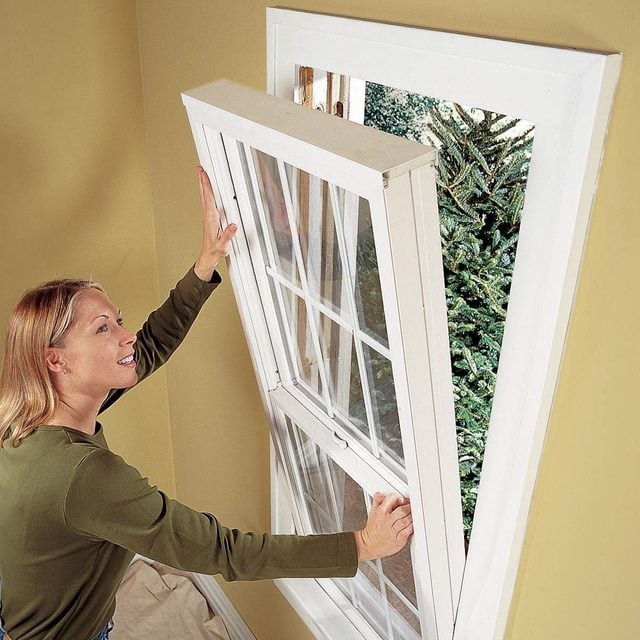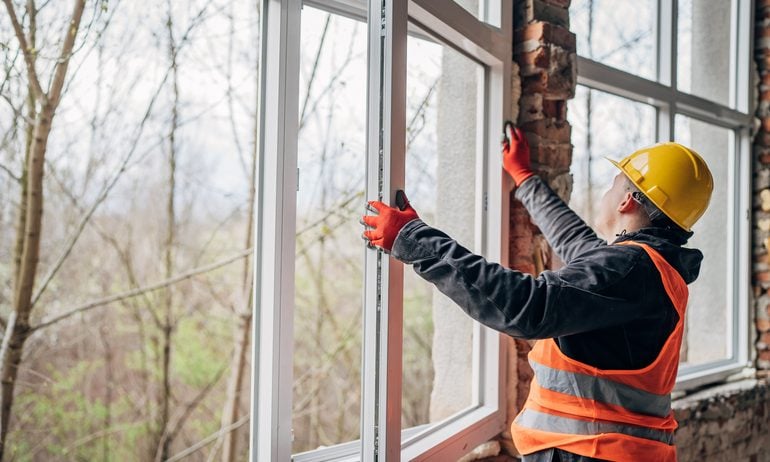The Complete Guide to Window Replacement: Understanding When It's Time for a Change in Your Home
Recognizing when to change windows can considerably impact a home's convenience and efficiency. Homeowners commonly overlook refined signs of damage, such as drafts or condensation. Understanding these signs and the benefits of new windows is necessary. In addition, understanding of numerous window kinds can assist selections. As the process unravels, many concerns develop. What should one anticipate throughout installment? Checking out these elements can lead to a more educated decision.
Indicators You Required to Replace Your Windows
How can a homeowner inform when it's time to replace their windows? There are several clear signs showing that substitute is needed. To begin with, visible damage such as fractures, chips, or warping can jeopardize window stability. House owners should also view for drafts or obvious temperature changes near the windows, recommending poor insulation. Another indicator is condensation accumulation between window panes, which can indicate seal failure. This might aim to architectural problems if windows are hard to close or open up. In addition, fading or staining of indoor home furnishings may suggest inadequate UV protection. An increase in energy bills can suggest that old, ineffective windows are no longer carrying out properly. Identifying these signs early can assist house owners make notified decisions concerning window substitute, ensuring their home continues to be comfortable and energy-efficient.

Benefits of Window Replacement
Replacing windows supplies countless benefits that can considerably boost a home's functionality and aesthetic appeals. One substantial benefit is boosted energy efficiency, as modern-day windows generally feature advanced insulation innovations that help in reducing heating & cooling costs (Window Installation). This not just lowers energy expenses yet likewise decreases the home's carbon impact
Furthermore, new windows can enhance the overall look of a residential property, enhancing curb allure and potentially boosting its market worth. Homeowners often locate that updated windows allow for much better all-natural light, developing an extra welcoming ambience inside your home.
Furthermore, substitute windows can improve security attributes, making it more challenging for trespassers to get in. Several new window options come with low-maintenance finishes, minimizing the time and initiative needed for upkeep. In general, window replacement is a critical financial investment that attends to both practical and visual demands, giving long-term benefits for home owners.
Understanding Various Window Types

Window Frame Materials
When selecting window frameworks, home owners encounter a variety of materials, each offering unique advantages and disadvantages. Vinyl structures are prominent for their cost and low maintenance, supplying excellent insulation yet limited color alternatives. Timber structures exude all-natural beauty and excellent insulation but require normal upkeep to stop rot and warping. Light weight aluminum frames are understood for their stamina and durability, making them perfect for modern layouts, yet they perform warmth and cold, which can influence energy efficiency. Fiberglass frameworks provide an equilibrium between toughness and power efficiency, standing up to bending and fading over time. Ultimately, the option of window frame material must align with the house owner's aesthetic choices, spending plan, and long-lasting upkeep plans to guarantee a suitable suitable for their home.
Power Efficiency Ratings
Power performance ratings play a crucial role in the selection of windows, as they straight affect a home's comfort and energy expenses. These ratings, typically offered by companies such as the National Fenestration Ranking Council (NFRC), examine different efficiency factors, consisting of U-factor, solar heat gain coefficient (SHGC), and visible passage (VT) The U-factor measures the price of warm transfer, indicating insulation performance; a lower worth represents far better energy effectiveness. SHGC evaluates how much solar warm gets in via the window, with lower values being more effective in hotter climates. VT mirrors the quantity of natural light transferred, balancing power performance with lighting requirements. Comprehending these scores assists property owners make notified decisions when replacing windows, ensuring perfect power performance.
Styles and Designs
Numerous window styles designs significantly affect both the looks and functionality of a home. Homeowners can choose from a range of alternatives, each offering unique characteristics. Double-hung windows offer comfort and air flow, while casement windows use unobstructed sights and boosted energy efficiency. Photo windows develop a remarkable prime focus and take full advantage of natural light, whereas gliding windows are optimal for contemporary areas with limited exterior access. Bay and bow windows prolong exterior, adding architectural interest and space. Additionally, specialized windows, like round-top or arched designs, can internet introduce unique panache. Inevitably, choosing the best design guarantees that the windows not only complement the home's overall style yet additionally satisfy particular practical demands, boosting both beauty and efficiency.
Power Efficiency and Your Windows
While numerous homeowners might neglect the effect of windows on power intake, these crucial components play a vital function in maintaining a comfy indoor setting. Energy-efficient windows are created to lessen heat transfer, minimizing the energy needed for heating & cooling. They commonly include several panes, low-emissivity (Low-E) layers, and gas fills, which boost insulation residential or commercial properties.
Picking the best windows can bring about significant cost savings on power expenses, along with a minimized carbon footprint. Property owners must take into consideration the U-factor and Solar Warmth Gain Coefficient (SHGC) ratings, as these metrics show a home window's power performance. Appropriate installation is similarly important; even one of the most efficient window can underperform otherwise set up correctly.
Regular maintenance, such as looking for drafts and resealing, can also enhance energy efficiency. Replacement Windows. Eventually, investing in energy-efficient windows not just adds to comfort however additionally boosts the total sustainability of the home
Choosing the Right Window Design for Your Home

Furthermore, building design plays an essential duty in this choice. Craftsman homes may gain from divided-light windows, while contemporary styles often favor big, extensive panes. Shade and material choices, consisting of timber, light weight aluminum, or plastic, additionally affect both look and upkeep demands. Inevitably, the right window design not just improves the visual appeal however also adds to the home's overall power efficiency, making sure both comfort and an eye-catching outside for many years ahead.
The Window Replacement Process: What to Anticipate
The window replacement process involves several crucial actions that homeowners should understand. An assessment is performed to figure out the ideal windows for the space, adhered to by the important setup day. Comprehending these stages can aid ensure a smooth changeover and satisfying outcomes.
Preliminary Assessment Tips
How can home owners successfully prepare for a home window replacement? The first analysis steps are vital for an effective project. Initially, they should review the current problem of their windows, noting any signs of damage, leaks, or inadequacy. Next off, gauging the dimensions of each window structure accurately is crucial for choosing the appropriate replacements. House owners need to also take into consideration the building design of their home, as this will influence their selections. Additionally, they should analyze their budget, establishing just how much they are eager to purchase the brand-new windows. Ultimately, looking into neighborhood professionals can give understandings into the installation process, making sure homeowners are educated prior to making any choices. These actions lay a solid structure for a smooth window substitute trip.
Picking the Right Windows
When homeowners commence on the trip of window substitute, they have to very carefully take into consideration different aspects to ensure they select the best windows for their demands. Key factors to consider include the window style, material, power efficiency, and budget plan. Various designs, such as double-hung, sash, or gliding windows, Discover More Here use special looks and functionality. The option of products, like vinyl, wood, or fiberglass, impacts longevity and maintenance. Energy performance rankings, such as U-factor and Solar Warmth Gain Coefficient, play a necessary function in long-term expense savings and convenience. Furthermore, property owners should review their budget plan, balancing top quality and cost. Consulting with experts can give suggestions and insights customized to individual choices and home requirements, ensuring an educated choice.
Setup Day Process
On installation day, homeowners can anticipate a well-coordinated process that transforms their living room. Expert installers typically get here early, geared up with the essential tools and products. They start by preparing the work location, ensuring furniture and belongings are shielded. Each window is thoroughly gotten rid of, with attention paid to the surrounding framework to avoid damage. New windows are then set up, making certain visit site proper sealing and insulation to improve power efficiency. The team performs a comprehensive examination to validate that each window operates efficiently. They cleanse up the website, getting rid of particles and old products. House owners are motivated to obtain and ask inquiries guidance on upkeep, guaranteeing a smooth shift to their recently updated windows.
Frequently Asked Questions
How Long Does a Typical Window Replacement Job Take?
A normal window replacement task typically takes one to two days, depending on factors such as the number of windows being replaced, the complexity of the setup, and weather influencing the timeline.
What Is the Ordinary Cost of Window Replacement?
The average cost of window substitute usually varies from $300 to $1,000 per window, depending on factors such as materials, size, and installment intricacy. House owners must think about these variables when budgeting for the job.
Can I Replace Windows Myself or Hire a Specialist?
Individuals can replace windows themselves if they have sufficient skills and devices; nonetheless, employing a professional is often advised for optimal outcomes, guaranteeing appropriate installation, energy efficiency, and compliance with regional building codes.
Exist Any Type Of Local Rules for Window Replacement?
Regional policies for window substitute vary by municipality and might include licenses, zoning laws, and safety and security requirements. Homeowners need to inspect with neighborhood authorities to confirm compliance before waging any kind of window replacement task.
What Guarantees Are Typically Used on New Windows?
Generally, guarantees for brand-new windows include minimal lifetime protection on products and efficiency, along with details terms for labor. Producers might likewise supply varying durations for glass damage and weatherproofing, depending on the item.
Double-hung windows provide benefit and air flow, while casement windows offer unblocked sights and enhanced power performance. Photo windows develop a dramatic focal point and make the most of all-natural light, whereas sliding windows are suitable for modern spaces with restricted outside access. Double-hung windows offer standard beauty and excellent ventilation, while casement windows, pivoted at the side, offer unblocked sights and superior airflow. When property owners begin on the trip of window substitute, they should meticulously consider various elements to ensure they select the best windows for their requirements. The typical expense of window replacement commonly ranges from $300 to $1,000 per window, depending on factors such as materials, size, and installation intricacy.